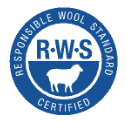 TEXTILE Exchange’s international wool assurance system, the Responsible Wool Standard, is investigating alignment with a global sheep meat standard.
TEXTILE Exchange’s international wool assurance system, the Responsible Wool Standard, is investigating alignment with a global sheep meat standard.
The RWS is the Textile Exchange’s voluntary global third party audited assurance standard that aims to protect the welfare of sheep, preserve land health and provide full supply chain traceability, from farm to final product.
Key RWS animal husbandry requirements include no mulesing, although farms with Ceased Mulesing status are accepted. Tail docking and castration is to be based on a welfare/risk benefit analysis and pain relief should be given for shearing injuries.
TE consultant and RWS technical group member Stuart Adams said RWS’s potential alignment with a global meat standard would be discussed at a RWS Australia/New Zealand Wool Grower and Broker Webinar on February 23. Mr Adams was in Australia this month talking with wool brokers and growers about the RWS.
“One of our aims is to work with an existing global meat standard, and one of these that has come across our desk is the Global Animal Partnership, coming out of the United States.”
“It’s important to note that all these meat standards are asking the same questions, similar questions to the RWS,” he said.
For more information on the Global Animal Partnership, click here.
Textile Exchange’s aim is one meat and wool audit
Mr Adams said it was Textile Exchange’s aim to try to have one audit on the farm which covered meat and wool.
“If we can get to that outcome, the farmer’s job is going to be far easier by just doing that one audit.”
Mr Adams believes a meat standard is important for RWS-certified wool producers.
“A lot of Merino lambs are being finished to go into the meat market.
“A good standard makes for an easier conversation with consumers.”
Regular trade enquiries for RWS wool
Mr Adams said Australian brokers are getting regular export trade enquiries for Responsible Wool Standard-certified wool, RWS technical committee member Stuart Adams.
“And what we are hearing from the grower level is that they are really happy with the standard, but are already getting concerned about the multiple standards available.”
RWS certified wool must come from non-mulesed sheep or from a flock that has ceased mulesing. However, Australian wool from non-mulesed flocks is already marketed or verified using other systems, including SustainaWOOL, New Merino, and the AWEX National Wool Declaration.
“What we are pushing for is for the RWS to become that backbone, the core animal welfare and land management standard, and then encouraging brands, other supply chains or grower groups to build on top of the RWS.”
RWS grower groups forming
Mr Adams said several Australian grower groups were forming to become RWS certified and several lines of RWS certified wool had been sold.
“There are definitely lines of RWS certified wool being sold through the AWEX catalogue that are attracting good premiums.”
However, documentation was still one of the main issues impacting uptake of the RWS, he said.
“Any professional wool grower has no problems with complying with the intents of the standard, the challenges have been with the documentation.
“That is where we are seeing the majority of non-conformities – animal welfare is great, land management is great, it is just all around record-keeping.”
Mr Adams said the February Webinar will cover RWS grower certification, supply chain issues, brand and retailer feedback.
“There are a lot of signals starting to come back to the wool brokers, but they just don’t have enough wool.
“The webinar will cover the process of becoming certified and how to work with the certifying bodies.”
Textile Exchange also hoped to organise an RWS training day for growers and brands in Australia next month.
The February 23 webinar presented by Mr Adams will run from 12.30pm-1.30pm AEDT for Australian growers or from 2.30pm-3.30pm New Zealand time. The webinar will also outline the new RWS Roundtable. To pre-register for the webinar click here.

What a complete waste of time and money is Textile Exchange. They should be ignored.